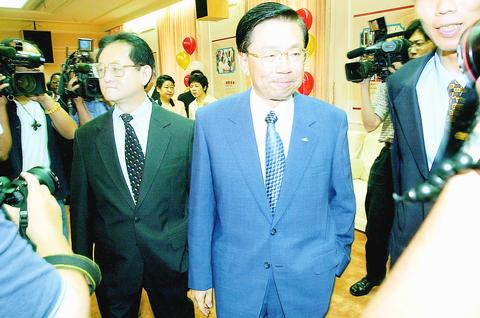Outgoing Secretary General of the International Cooperation and Development Fund (ICDF) Loh Ping-cheung (
"I can assure you that the way the institutions are structured, it's impossible for the fund to do anything that violates the foreign ministry's policy," Loh said.

PHOTO: CHEN CHENG-CHANG, TAIPEI TIMES
Loh made the remarks in an address at the organization's five-year anniversary celebration, which was viewed by some as Loh's farewell speech.
Quieting Speculation
Loh resigned on June 19 amid speculation the move was trig-gered by his longstanding disagreement with the ministry over the evaluation and implementation of foreign aid and development projects.
Loh, who worked for the World Bank from 1964 to 1996, said that he believes that he has "left some legacies" which he said can serve as "paradigms" for the organization.
In an apparent move to dismiss charges made by foreign ministry officials that the fund under Loh ignored Taiwan's foreign policy considerations, Loh said the ICDF consulted overseas offices regarding aid projects.
"The fund has carried out the three-year foreign assistance rolling core program which requires the foreign ministry to have three-years notice before a project is implemented.
"Taiwan's embassies and overseas representative offices offer their input on every project [under the ICDF]," Loh said.
`No way' was there a violation
"Any of the fund's activities that are outside the rolling core program and that require financial support require approval from the foreign ministry.
"This is a system that I've established and there is no way that I would violate such an operation," Loh told reporters after the ceremony.
Loh said Taiwan's development in areas such as agricultural transformation and small-and-medium enterprises have become yardsticks for the fund's foreign aid programs.
The fund also tried to use its limited resources as efficiently as possible when carrying out foreign aid projects, Loh said.
A `great loss'
Some staffers at the fund regretted Loh's resignation, saying his absence from the five-year-old organization is a "great loss" for the institution.
Ko Yu-chin (
When asked by the Taipei Times to respond to the allegations against him, Loh said: "I am not at the same level as those who have a problem with me. I am above that."
Macedonia link?
The immediate cause of Loh's resignation, some media have claimed, is related to the handling of shaky Taiwan-Macedonia ties in early June.
Loh had reportedly proposed offering Macedonia a so-called "peace fund" to help reconstruct the crisis-torn Balkan state as a last-ditch effort to maintain ties with the country.
Foreign ministry spokeswoman Katharine Chang (張小月), however, immediately denied the proposal was related to Macedonia, saying the idea was still in its infancy and was "purely a product of some people within the fund."
Loh will go on leave this Friday until his resignation is formally approved by the fund's board of directors at a meeting scheduled for July 25, sources said.

DAREDEVIL: Honnold said it had always been a dream of his to climb Taipei 101, while a Netflix producer said the skyscraper was ‘a real icon of this country’ US climber Alex Honnold yesterday took on Taiwan’s tallest building, becoming the first person to scale Taipei 101 without a rope, harness or safety net. Hundreds of spectators gathered at the base of the 101-story skyscraper to watch Honnold, 40, embark on his daredevil feat, which was also broadcast live on Netflix. Dressed in a red T-shirt and yellow custom-made climbing shoes, Honnold swiftly moved up the southeast face of the glass and steel building. At one point, he stepped onto a platform midway up to wave down at fans and onlookers who were taking photos. People watching from inside

A Vietnamese migrant worker yesterday won NT$12 million (US$379,627) on a Lunar New Year scratch card in Kaohsiung as part of Taiwan Lottery Co’s (台灣彩券) “NT$12 Million Grand Fortune” (1200萬大吉利) game. The man was the first top-prize winner of the new game launched on Jan. 6 to mark the Lunar New Year. Three Vietnamese migrant workers visited a Taiwan Lottery shop on Xinyue Street in Kaohsiung’s Gangshan District (崗山), a store representative said. The player bought multiple tickets and, after winning nothing, held the final lottery ticket in one hand and rubbed the store’s statue of the Maitreya Buddha’s belly with the other,

Japan’s strategic alliance with the US would collapse if Tokyo were to turn away from a conflict in Taiwan, Japanese Prime Minister Sanae Takaichi said yesterday, but distanced herself from previous comments that suggested a possible military response in such an event. Takaichi expressed her latest views on a nationally broadcast TV program late on Monday, where an opposition party leader criticized her for igniting tensions with China with the earlier remarks. Ties between Japan and China have sunk to the worst level in years after Takaichi said in November that a hypothetical Chinese attack on Taiwan could bring about a Japanese

‘COMMITTED TO DETERRENCE’: Washington would stand by its allies, but it can only help as much as countries help themselves, Raymond Greene said The US is committed to deterrence in the first island chain, but it should not bear the burden alone, as “freedom is not free,” American Institute in Taiwan Director Raymond Greene said in a speech at the Institute for National Defense and Security Research’s “Strengthening Resilience: Defense as the Engine of Development” seminar in Taipei yesterday. In the speech, titled “Investing Together and a Secure and Prosperous Future,” Greene highlighted the contributions of US President Donald Trump’s administration to Taiwan’s defense efforts, including the establishment of supply chains for drones and autonomous systems, offers of security assistance and the expansion of